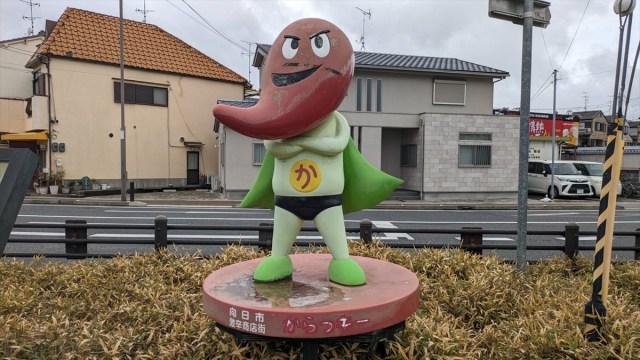
A trip that was meant to be pleasantly nostalgic resulted in a big shock, but also came with a silver, spicy lining.
Muko City in Kyoto Prefecture is a small city just to the west of Kyoto City. In 2009, Muko began a revitalization campaign by designating select eateries as part of an area dubbed Gekikara Shotengai, meaning “Super Spicy Shopping Market.” Our Japanese-language reporter with a fondness for wine lucky boxes and spicy food, Haruka Takagi, had visited the area during her student days 10 years ago and had a blast trying some of the spiciest food she had ever tasted. She hadn’t heard much about the area in recent years, though, and recently decided to pay it a visit.
In Haruka’s memory, there was a lively shopping complex called Life City next to the heart of Gekikara Shotengai and not far from Higashi-Muko Station, so that’s where she headed first. The atmosphere of the station felt the same as it did 10 years ago.
That didn’t mean nothing had changed, though. The retro-style cafe next to the station had closed and was replaced by a standing bar called Suiba. She thought a quick drink might actually be nice for people waiting for a train or bus, and the prices were definitely reasonable.
As Haruka headed straight out from the station, she caught sight of an intersection with a steady stream of cars but no traffic signal. There was also a Gyoza no Ohsho location that she recognized from her previous visit but hadn’t eaten at since she had opted for a Gekikara Shotengai spicy restaurant called Minmin instead.
From there she headed west, where Life City and Gekikara Shotengai were waiting for her.
…make that where they should have been waiting for her. She was rattled to her core. All she could find of the Gekikara Shotengai was one sign with the character for kara (辛) or “spicy.” Even more shocking, however, was that the spot where Life City had been was now a lonely-looking abandoned lot.
What the heck was going on here?! She kept walking, lost and befuddled. Where was the market? The banners? The signs proclaiming “Beware of gekikara (ultra spiciness)”?!
Did she make a wrong turn somewhere, or were her memories mistaken? She had come all this way to Muko City to find nothing. It was as if she had been tricked into believing some fake memories she had of this place.
As she kept circling the area between the station and where Life City should have been with an extremely puzzled expression, a male security guard who was directing traffic at the intersection approached her.
Guard: “Excuse me, are you looking for something?”
Haruka: “Isn’t the Gekikara Shotengai supposed to be around here?”
Guard: “Ah, that place. It’s not here anymore.”
Haruka: “Not…here…?!”
Guard: “That’s right. This area has changed a lot. See over there? A huge apartment complex was built and Life City was completely demolished. On the other side [east side] of the tracks there are still a few shops, but for the most part, Gekikara Shotengai no longer exists.”
Haruka thanked him and began to walk away, but the devastation of hearing that the spicy area no longer existed prevented her mouth from forming any other words. She’d figured it might be smaller than it was back in the peak of its popularity…but to learn that it was basically wiped off the map was too shocking. Searching on her phone, she also learned that Life City had closed in 2020 but wasn’t demolished until late 2023–so the structure of it had remained until recently.
While almost all of her motivation had now deflated, she still latched onto the nugget that the man had told her about there still being a few shops on the other side of the train tracks. She decided to pay that side a visit before going home. She trudged along, crossing the tracks, and within two minutes caught sight of something promising on a shopfront.
Yes, it really was there–at the Tonkotsu Himawari (“sunflower”) restaurant, there was a banner for Gekikara Shotengai!!
And that wasn’t all, because she also spotted Kirinen, a famous Chinese-style restaurant that had made countless people cry from its ultra spicy tantanmen and mapo tofu.
Thankfully, there was still spice to be found in this town after all.
While Haruka had been searching in vain earlier, both of the restaurants had finished their lunch service, but that didn’t matter to her at this point. Sure, it would have been nice to eat at one of them, but just being able to finally see the Gekikara Shotengai banners with her own eyes after that rollercoaster ride of emotions made coming all the way to Muko City worth it in the end. She wanted to cry in happiness.
Things took an even better turn as she headed back to Higashi-Muko Station and a familiar character came into view.
It was none other than Kalucky, the mascot character of Gekikara Shotengai with a pepper for a head. His name is a portmanteau of kara, meaning “spicy,” and the English word “lucky.”
A monument of Kalucky with slightly faded colors was still standing, too. He stood proudly as if to tell the world that yes, Muko City is still a city that seeks to champion super spicy things.
At this point Haruka was really was craving something spicy, so she pulled up Google maps and found a miraculous discovery about 15 minutes away by car in Kyoto City’s Fushimi Ward: a famous mapo tofu specialty restaurant called Karaimonya.
There was no way she was going to miss this opportunity so she grabbed a cab and headed over. A bowl of the famous mapo tofu cost 950 yen (US$6.40), plus, for an additional 100 yen, she was able to order it “extra spicy.”
▼ At Karaimonya, you choose your desired spiciness level and whether you’d like rice or noodles.
It turned out to be some of the darkest, most intense-looking mapo tofu sauce she had ever seen.
To sum up her first bite in five words: umami – hotness – depth – fragrance – NUMBNESS.
It was so incredibly spicy that Haruka’s taste buds seemed to be confusing the spice for actual temperature heat. Even while eating it with white rice, her body felt like it was growing warmer and warmer with each bite, with beads of sweat glistening from her pores. Her stomach felt like it was smoldering inside, but she didn’t care because it was just so darn delicious.
Filled with supreme spicy satisfaction, the earlier sadness of the day seemed off in a far, distant place.
While her trip wasn’t anything like the nostalgic walk down memory lane that she had expected, Haruka is still glad that she went. She also says that you should take this experience as a sign to revisit all of those beloved places in your memories while you still can.
Reference: Kyoto Muko City Gekikara Shotengai, Karaimonya, Himawari, Kirinen
All images © SoraNews24
● Want to hear about SoraNews24’s latest articles as soon as they’re published? Follow us on Facebook and Twitter!
[ Read in Japanese ]

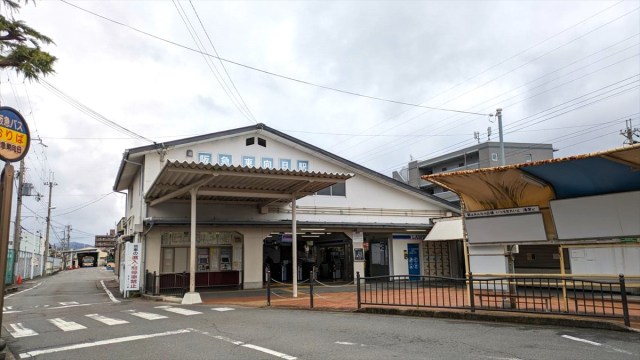
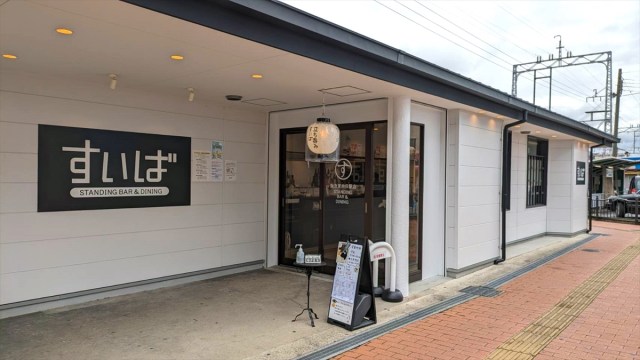
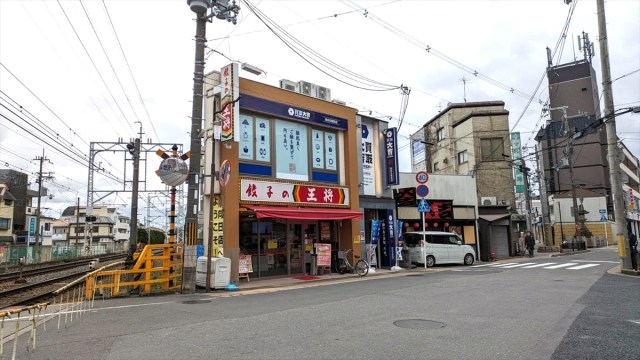
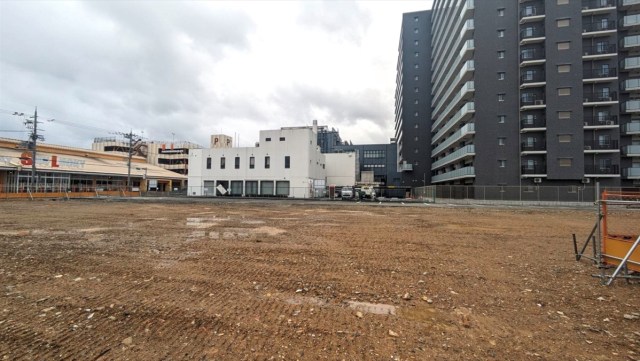
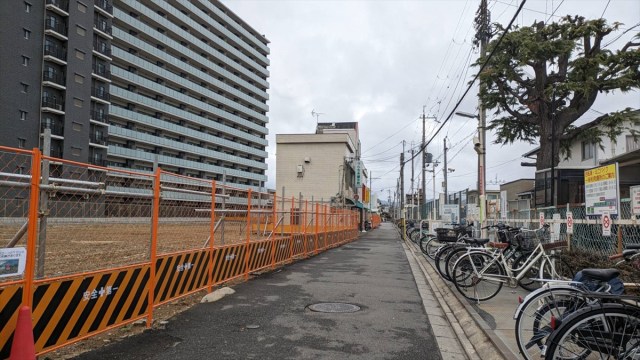
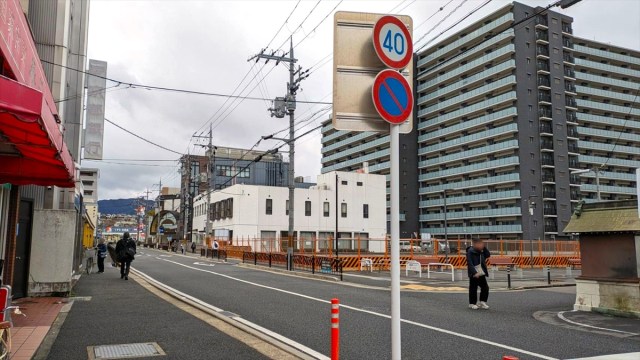
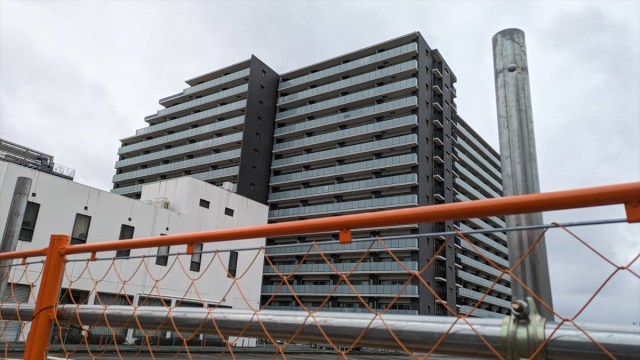
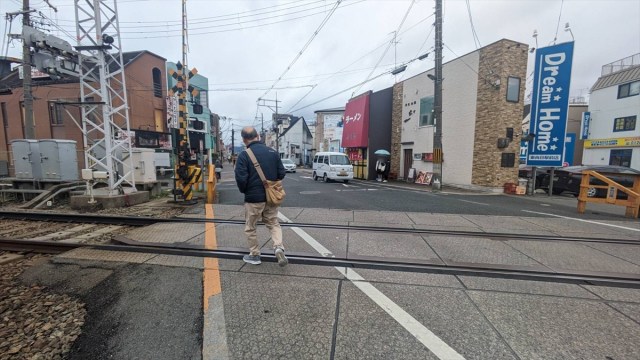
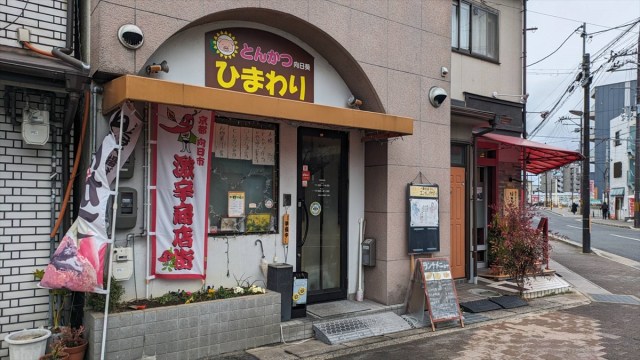
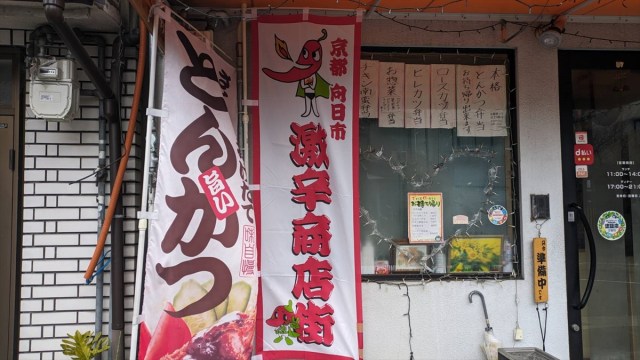
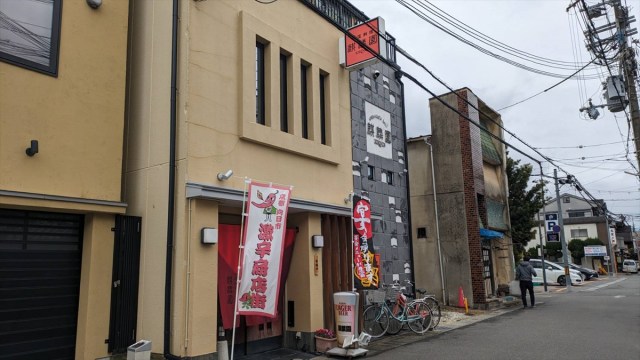
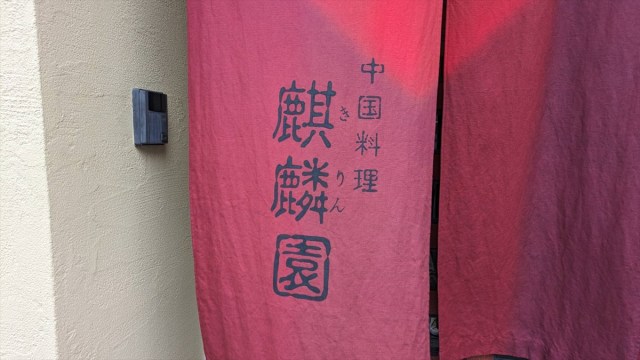
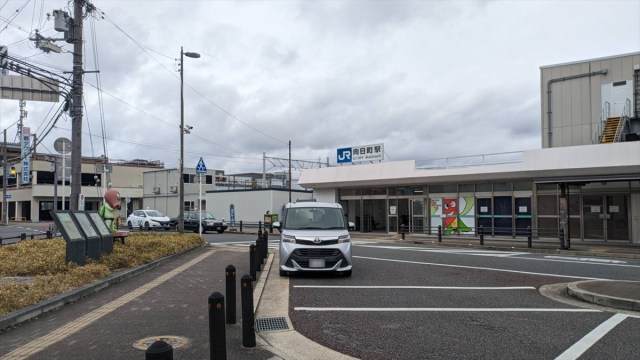
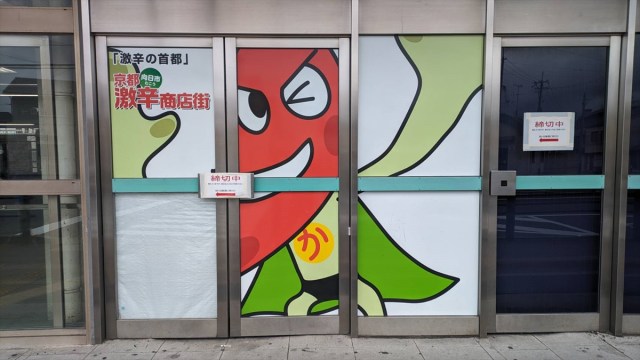
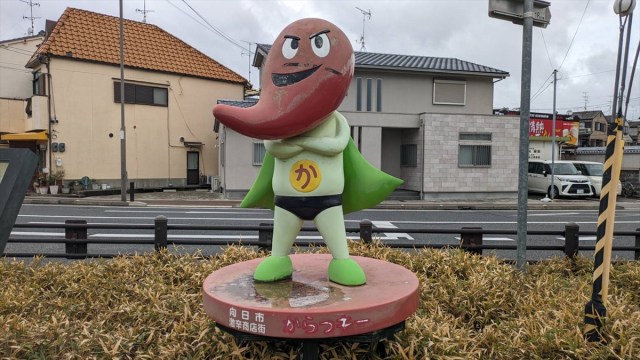
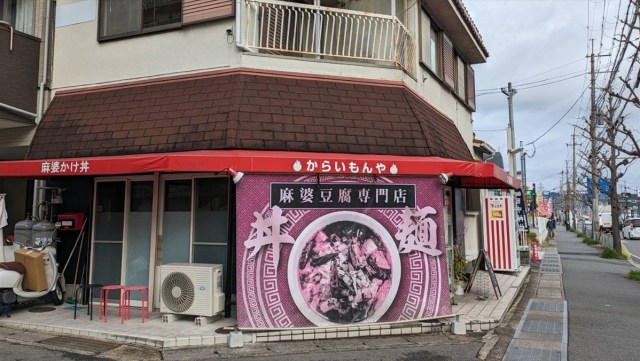
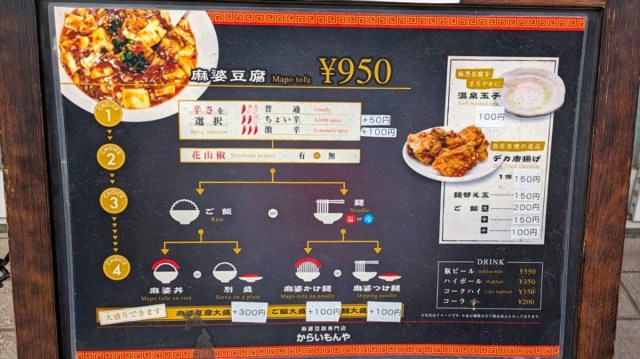
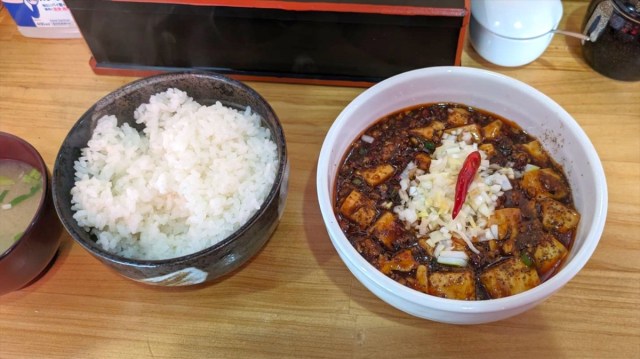
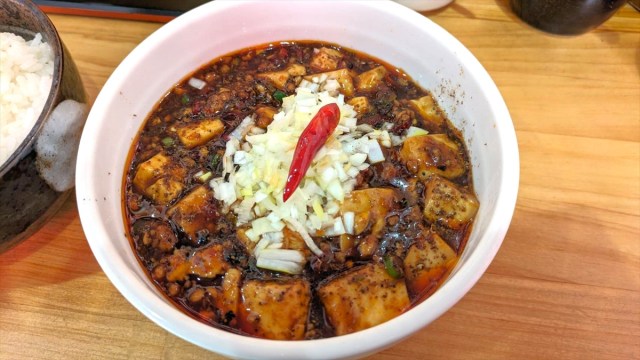
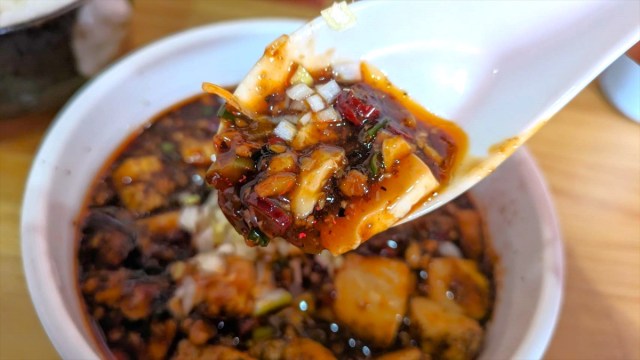
 Free food awaits those who finish “Spicy Mapo Tofu of Hell,” but it isn’t easy
Free food awaits those who finish “Spicy Mapo Tofu of Hell,” but it isn’t easy Lawson convenience stores selling drinkable mapo tofu, spicy meat and tofu
Lawson convenience stores selling drinkable mapo tofu, spicy meat and tofu McDonald’s Japan releases Spicy Chicken McNuggets so spicy they’ll knock you out? 【Taste Test】
McDonald’s Japan releases Spicy Chicken McNuggets so spicy they’ll knock you out? 【Taste Test】 Visit a pepper-packed tribute to spiciness tucked away in an Osaka food court
Visit a pepper-packed tribute to spiciness tucked away in an Osaka food court Japanese vending machine in Edo-period town sells a very rare type of tofu
Japanese vending machine in Edo-period town sells a very rare type of tofu Potama serves up epic rice balls like no other, and there’s only one store in Tokyo
Potama serves up epic rice balls like no other, and there’s only one store in Tokyo Chance to play Teris on a massive staircase in Kyoto Station coming in March
Chance to play Teris on a massive staircase in Kyoto Station coming in March Lawson adds doughnuts to its convenience store sweets range, but are they good enough to go viral?
Lawson adds doughnuts to its convenience store sweets range, but are they good enough to go viral? Ramen for 99 yen?!? Best value-for-money noodles found at unlikely chain in Japan
Ramen for 99 yen?!? Best value-for-money noodles found at unlikely chain in Japan Starbucks Japan adds new sakura Frappuccino and cherry blossom drinks to the menu
Starbucks Japan adds new sakura Frappuccino and cherry blossom drinks to the menu “Let’s Speak North Korean!”
“Let’s Speak North Korean!” New smartphone game turns car models into anime girls with model-worthy looks
New smartphone game turns car models into anime girls with model-worthy looks Tiny house by Muji finally goes on sale in Japan
Tiny house by Muji finally goes on sale in Japan Live-action Pokémon cooking videos melt the heart, whet the appetite【Videos】
Live-action Pokémon cooking videos melt the heart, whet the appetite【Videos】 Death Spray from Japan causes buzz online for powerful ability to cut ties with bad energy
Death Spray from Japan causes buzz online for powerful ability to cut ties with bad energy Starbucks Japan releases first-ever Hinamatsuri Girls’ Day Frappuccino
Starbucks Japan releases first-ever Hinamatsuri Girls’ Day Frappuccino Japanese restaurant chain serves Dragon Ball donuts and Senzu Beans this spring
Japanese restaurant chain serves Dragon Ball donuts and Senzu Beans this spring Highest Starbucks in Japan set to open this spring in the Tokyo sky
Highest Starbucks in Japan set to open this spring in the Tokyo sky Japan Extreme Budget Travel! A trip from Tokyo to Izumo for just 30,000 yen [Part 1]
Japan Extreme Budget Travel! A trip from Tokyo to Izumo for just 30,000 yen [Part 1] Japan has only one airport named after a samurai, so let’s check out Kochi Ryoma【Photos】
Japan has only one airport named after a samurai, so let’s check out Kochi Ryoma【Photos】 Japan Extreme Budget Travel! A trip from Tokyo to Izumo for just 30,000 yen [Part 2]
Japan Extreme Budget Travel! A trip from Tokyo to Izumo for just 30,000 yen [Part 2] Japan’s craziest burger chain takes menchi katsu to new extreme levels
Japan’s craziest burger chain takes menchi katsu to new extreme levels Japanese drugstore sells onigiri at pre-stupid era prices, but how do they compare to 7-Eleven?
Japanese drugstore sells onigiri at pre-stupid era prices, but how do they compare to 7-Eleven? Yakuzen ramen restaurant in Tokyo is very different to a yakuza ramen restaurant
Yakuzen ramen restaurant in Tokyo is very different to a yakuza ramen restaurant Tokyo Skytree turns pink for the cherry blossom season
Tokyo Skytree turns pink for the cherry blossom season Japan’s newest Shinkansen has no seats…or passengers [Video]
Japan’s newest Shinkansen has no seats…or passengers [Video] Starbucks Japan releases new sakura goods and drinkware for cherry blossom season 2026
Starbucks Japan releases new sakura goods and drinkware for cherry blossom season 2026 Foreigners accounting for over 80 percent of off-course skiers needing rescue in Japan’s Hokkaido
Foreigners accounting for over 80 percent of off-course skiers needing rescue in Japan’s Hokkaido Super-salty pizza sends six kids to the hospital in Japan, linguistics blamed
Super-salty pizza sends six kids to the hospital in Japan, linguistics blamed Starbucks Japan unveils new sakura Frappuccino for cherry blossom season 2026
Starbucks Japan unveils new sakura Frappuccino for cherry blossom season 2026 Foreign tourists in Japan will get free Shinkansen tickets to promote regional tourism
Foreign tourists in Japan will get free Shinkansen tickets to promote regional tourism The 10 most annoying things foreign tourists do on Japanese trains, according to locals
The 10 most annoying things foreign tourists do on Japanese trains, according to locals Take a trip to Japan’s Dododo Land, the most irritating place on Earth
Take a trip to Japan’s Dododo Land, the most irritating place on Earth Naruto and Converse team up for new line of shinobi sneakers[Photos]
Naruto and Converse team up for new line of shinobi sneakers[Photos] Is China’s don’t-go-to-Japan warning affecting the lines at a popular Tokyo gyukatsu restaurant?
Is China’s don’t-go-to-Japan warning affecting the lines at a popular Tokyo gyukatsu restaurant? Survey asks foreign tourists what bothered them in Japan, more than half gave same answer
Survey asks foreign tourists what bothered them in Japan, more than half gave same answer Japan’s human washing machines will go on sale to general public, demos to be held in Tokyo
Japan’s human washing machines will go on sale to general public, demos to be held in Tokyo Starbucks Japan releases new drinkware and goods for Valentine’s Day
Starbucks Japan releases new drinkware and goods for Valentine’s Day We deeply regret going into this tunnel on our walk in the mountains of Japan
We deeply regret going into this tunnel on our walk in the mountains of Japan Studio Ghibli releases Kodama forest spirits from Princess Mononoke to light up your home
Studio Ghibli releases Kodama forest spirits from Princess Mononoke to light up your home Major Japanese hotel chain says reservations via overseas booking sites may not be valid
Major Japanese hotel chain says reservations via overseas booking sites may not be valid Put sesame oil in your coffee? Japanese maker says it’s the best way to start your day【Taste test】
Put sesame oil in your coffee? Japanese maker says it’s the best way to start your day【Taste test】 No more using real katana for tourism activities, Japan’s National Police Agency says
No more using real katana for tourism activities, Japan’s National Police Agency says Eating sushi…from a vending machine? We try Toyama Prefecture’s local delicacy, masuzushi
Eating sushi…from a vending machine? We try Toyama Prefecture’s local delicacy, masuzushi Is Kyoto less crowded with tourists after China’s don’t-go-to-Japan warning?【Photos】
Is Kyoto less crowded with tourists after China’s don’t-go-to-Japan warning?【Photos】 Can Kyoto supermarket takeout let you enjoy the local cuisine without fancy restaurant prices?
Can Kyoto supermarket takeout let you enjoy the local cuisine without fancy restaurant prices? This budget hotel near Tokyo Dome has one of the best breakfast buffets in the city
This budget hotel near Tokyo Dome has one of the best breakfast buffets in the city Japan has a wild boar and venison vending machine, and here’s a great dish to make with its meat
Japan has a wild boar and venison vending machine, and here’s a great dish to make with its meat Japan’s caramel gacha machines offer sweet thrills, but do they deliver?
Japan’s caramel gacha machines offer sweet thrills, but do they deliver? Domino’s Japan has all-you-can-eat pizza isn’t an Internet rumor, but it is hard to find
Domino’s Japan has all-you-can-eat pizza isn’t an Internet rumor, but it is hard to find 7 ways people in Japan deal with heavy snow, including the use of special ponds called “tane”
7 ways people in Japan deal with heavy snow, including the use of special ponds called “tane” Japan’s northernmost brewery on the mainland is…a temple?!?
Japan’s northernmost brewery on the mainland is…a temple?!? Can a famous Japanese hypnotist make us eat super spicy instant noodles?【Experiment】
Can a famous Japanese hypnotist make us eat super spicy instant noodles?【Experiment】 Is Kyoto really as crowded with foreign tourists as they say?
Is Kyoto really as crowded with foreign tourists as they say? Kyoto’s famous Chinese dish karashi soba can now be found in Lawson
Kyoto’s famous Chinese dish karashi soba can now be found in Lawson Conveyor belt sushi system for world cuisine? Special Kura Sushi branch has food from over 70 countries
Conveyor belt sushi system for world cuisine? Special Kura Sushi branch has food from over 70 countries Kyoto’s Nishiki Market has great bento boxed lunches, and here are our top 3 picks
Kyoto’s Nishiki Market has great bento boxed lunches, and here are our top 3 picks We visit the full-scale Evangelion statue in Kyoto and particularly delight in the food tie-ins
We visit the full-scale Evangelion statue in Kyoto and particularly delight in the food tie-ins